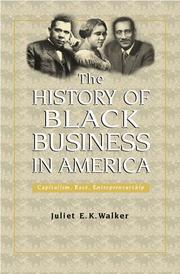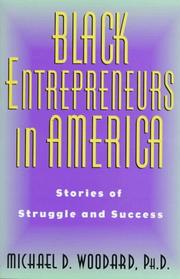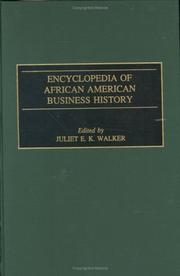| Listing 1 - 10 of 11 | << page >> |
Sort by
|

ISBN: 0805716505 Year: 1998 Publisher: New York MacMillan Library Reference Twayne Publishers
Abstract | Keywords | Export | Availability | Bookmark
 Loading...
Loading...Choose an application
- Reference Manager
- EndNote
- RefWorks (Direct export to RefWorks)

ISBN: 0813555345 0585022097 9780585022093 0813523680 Year: 1997 Publisher: New Brunswick, N.J. Rutgers University Press
Abstract | Keywords | Export | Availability | Bookmark
 Loading...
Loading...Choose an application
- Reference Manager
- EndNote
- RefWorks (Direct export to RefWorks)
In Black Entrepreneurs in America, Woodard lets us hear for the first time from many on the front lines of the American marketplace. Woodard begins the book with a summary of two hundred years of Black entrepreneurship in America, and then offers a lucid analysis of contemporary theories of Black business. Through in-depth interviews with twelve entrepreneurs, Woodard provides a powerful record of entrepreneurial vitality in a market that is often hostile and exclusive. Woodard covers businesses from across the United States representing diverse industries, including paper distribution, office furniture, computer management, construction, chemicals, ship building, communications, and systems engineering. Each business has a minimum gross revenue of $1 million per year and from ten to over two hundred employees. These twelve interviews make up the heart of the book, as Black entrepreneurs talk frankly about business challenges, Opportunities, and issues of community involvement. Woodard ends on a practical note with resources and advice for anyone contemplating an entrepreneurial future.
African American business enterprises --- Success in business --- Management --- Business & Economics --- Management Styles & Communication --- African American-owned business enterprises --- Afro-American business enterprises --- Business enterprises, African American --- Business enterprises --- Case studies.
Book
ISBN: 0812245415 1322513511 0812223799 081220865X Year: 2013 Publisher: Philadelphia : University of Pennsylvania Press,
Abstract | Keywords | Export | Availability | Bookmark
 Loading...
Loading...Choose an application
- Reference Manager
- EndNote
- RefWorks (Direct export to RefWorks)
Today, black-owned barber shops play a central role in African American public life. The intimacy of commercial grooming encourages both confidentiality and camaraderie, which make the barber shop an important gathering place for African American men to talk freely. But for many years preceding and even after the Civil War, black barbers endured a measure of social stigma for perpetuating inequality: though the profession offered economic mobility to black entrepreneurs, black barbers were obliged by custom to serve an exclusively white clientele. Quincy T. Mills traces the lineage from these nineteenth-century barbers to the bustling enterprises of today, demonstrating that the livelihood offered by the service economy was crucial to the development of a black commercial sphere and the barber shop as a democratic social space. Cutting Along the Color Line chronicles the cultural history of black barber shops as businesses and civic institutions. Through several generations of barbers, Mills examines the transition from slavery to freedom in the nineteenth century, the early twentieth-century expansion of black consumerism, and the challenges of professionalization, licensing laws, and competition from white barbers. He finds that the profession played a significant though complicated role in twentieth-century racial politics: while the services of shaving and grooming were instrumental in the creation of socially acceptable black masculinity, barbering permitted the financial independence to maintain public spaces that fostered civil rights politics. This sweeping, engaging history of an iconic cultural establishment shows that black entrepreneurship was intimately linked to the struggle for equality.
African Americans --- African American business enterprises --- Barbershops --- African American barbers --- Barbers, African American --- Barbers --- Barber shops --- Service industries --- African American-owned business enterprises --- Afro-American business enterprises --- Business enterprises, African American --- Business enterprises --- Afro-Americans --- Black Americans --- Colored people (United States) --- Negroes --- Africans --- Ethnology --- Blacks --- Race identity --- History --- Black people --- African Studies. --- African-American Studies. --- American History. --- American Studies.
Book
ISBN: 9780815652823 0815652828 9780815633631 0815633637 9780815610397 0815610394 Year: 2014 Publisher: Syracuse, New York
Abstract | Keywords | Export | Availability | Bookmark
 Loading...
Loading...Choose an application
- Reference Manager
- EndNote
- RefWorks (Direct export to RefWorks)
Entrepreneurship --- African American business enterprises --- Baseball --- African American baseball team owners --- Entrepreneur --- Intrapreneur --- Capitalism --- Business incubators --- Baseball team owners, African American --- Baseball team owners --- African American-owned business enterprises --- Afro-American business enterprises --- Business enterprises, African American --- Business enterprises --- History --- Eastern Colored League (Baseball league) --- Negro National League --- Eastern League (Baseball league)

ISBN: 0313008647 9780313008641 0313295492 9780313295492 1280927828 9786610927821 9798400607547 Year: 1999 Publisher: Westport, Conn. : London : Greenwood Press, Bloomsbury Publishing,
Abstract | Keywords | Export | Availability | Bookmark
 Loading...
Loading...Choose an application
- Reference Manager
- EndNote
- RefWorks (Direct export to RefWorks)
African American business enterprises --- Slavery --- Abolition of slavery --- Antislavery --- Enslavement --- Mui tsai --- Ownership of slaves --- Servitude --- Slave keeping --- Slave system --- Slaveholding --- Thralldom --- Crimes against humanity --- Serfdom --- Slaveholders --- Slaves --- African American-owned business enterprises --- Afro-American business enterprises --- Business enterprises, African American --- Business enterprises --- History. --- Enslaved persons
Book
ISBN: 080189283X 0801898307 9780801898303 9780801892837 Year: 2009 Publisher: Baltimore Johns Hopkins University Press
Abstract | Keywords | Export | Availability | Bookmark
 Loading...
Loading...Choose an application
- Reference Manager
- EndNote
- RefWorks (Direct export to RefWorks)
They advocated economic independence from whites and founded insurance companies that became some of the largest black-owned corporations.
SOCIAL SCIENCE --- Ethnic Studies / African American Studies --- African American barbers --- Free African Americans --- African American businesspeople --- African American business enterprises --- Labor & Workers' Economics --- Business & Economics --- History --- History. --- United States --- Race relations --- African American-owned business enterprises --- Afro-American business enterprises --- Business enterprises, African American --- Afro-American businesspeople --- Afro-Americans in business --- Businesspeople, African American --- Negro businessmen --- Negroes as businessmen --- Free Afro-Americans --- Free blacks --- Barbers, African American --- Business enterprises --- Businesspeople --- African Americans --- Barbers --- E-books --- Free Black people
Book
ISBN: 0252050029 9780252050022 0252041429 025208294X 9780252041426 Year: 2017 Publisher: Urbana
Abstract | Keywords | Export | Availability | Bookmark
 Loading...
Loading...Choose an application
- Reference Manager
- EndNote
- RefWorks (Direct export to RefWorks)
African American businesspeople --- African American business enterprises --- Entrepreneurship --- African Americans --- Afro-Americans --- Black Americans --- Colored people (United States) --- Negroes --- Africans --- Ethnology --- Blacks --- Entrepreneur --- Intrapreneur --- Capitalism --- Business incubators --- African American-owned business enterprises --- Afro-American business enterprises --- Business enterprises, African American --- Business enterprises --- Afro-American businesspeople --- Afro-Americans in business --- Businesspeople, African American --- Negro businessmen --- Negroes as businessmen --- Businesspeople --- History. --- Economic conditions. --- Social conditions. --- History --- Economic conditions --- Social conditions --- E-books --- Black people
Book
ISBN: 0813038197 0813043190 9780813043197 9780813038193 0813034736 9780813034737 Year: 2010 Publisher: Gainesville University Press of Florida
Abstract | Keywords | Export | Availability | Bookmark
 Loading...
Loading...Choose an application
- Reference Manager
- EndNote
- RefWorks (Direct export to RefWorks)
Michael Boston offers a radical departure from other interpretations of Booker T. Washington by focusing on the latter's business ideas and practices. More specifically, Boston examines Washington as an entrepreneur, spelling out his business philosophy at great length and discussing the influence it had on black America. He analyzes the national and regional economies in which Washington worked and focuses on his advocacy of black business development as the key to economic uplift for African Americans. The result is a revisionist book that responds to the skewed literature on
Success in business --- Entrepreneurship --- African American businesspeople --- African Americans --- African American leadership --- African American business enterprises --- Entrepreneur --- Intrapreneur --- Capitalism --- Business incubators --- Afro-American leadership --- Leadership, African American --- Negro leadership --- Leadership --- African American-owned business enterprises --- Afro-American business enterprises --- Business enterprises, African American --- Business enterprises --- Economic conditions. --- History. --- Washington, Booker T., --- Vāśiṅgaṭana, Vukara Ṭī., --- Washington, Booker Taliaferro, --- Philosophy. --- History --- Economic conditions --- E-books
Book
ISBN: 026251494X 026206281X 143565496X 0262272474 9780262272476 9781435654969 9780262062817 Year: 2008 Publisher: Cambridge, Mass. MIT Press
Abstract | Keywords | Export | Availability | Bookmark
 Loading...
Loading...Choose an application
- Reference Manager
- EndNote
- RefWorks (Direct export to RefWorks)
A comprehensive analysis of racial disparities and the determinants of entrepreneurial performance--in particular, why Asian-owned businesses on average perform relatively well and why black-owned businesses typically do not.Thirteen million people in the United States--roughly one in ten workers--own a business. And yet rates of business ownership among African Americans are much lower and have been so throughout the twentieth century. In addition, and perhaps more importantly, businesses owned by African Americans tend to have lower sales, fewer employees and smaller payrolls, lower profits, and higher closure rates. In contrast, Asian American-owned businesses tend to be more successful. In Race and Entrepreneurial Success, minority entrepreneurship authorities Robert Fairlie and Alicia Robb examine racial disparities in business performance. Drawing on the rarely used, restricted-access Characteristics of Business Owners (CBO) dataset compiled by the U.S. Census Bureau, Fairlie and Robb examine in particular why Asian-owned firms perform well in comparison to white-owned businesses and black-owned firms typically do not. They also explore the broader question of why some entrepreneurs are successful and others are not. After providing new comprehensive estimates of recent trends in minority business ownership and performance, the authors examine the importance of human capital, financial capital, and family business background in successful business ownership. They find that a high level of startup capital is the most important factor contributing to the success of Asian-owned businesses, and that the lack of startup money for black businesses (attributable to the fact that nearly half of all black families have less than $6,000 in total wealth) contributes to their relative lack of success. In addition, higher education levels among Asian business owners explain much of their success relative to both white- and African American-owned businesses. Finally, Fairlie and Robb find that black entrepreneurs have fewer opportunities than white entrepreneurs to acquire valuable pre-business work experience through working in family businesses.
SOCIAL SCIENCE --- Minority Studies --- Minority business enterprises --- African American business enterprises --- Asian American business enterprises --- Entrepreneurship --- Small business --- Success in business --- Industrial Management --- Management --- Business & Economics --- African American business enterprises. --- Asian American business enterprises. --- Businesses, Small --- Medium-sized business --- Micro-businesses --- Microbusinesses --- Microenterprises --- Small and medium-sized business --- Small and medium-sized enterprises --- Small businesses --- SMEs (Small business) --- Asian American-owned business enterprises --- Business enterprises, Asian American --- African American-owned business enterprises --- Afro-American business enterprises --- Business enterprises, African American --- Business --- Business enterprises --- Industries --- Size --- ECONOMICS/Labor Studies --- SOCIAL SCIENCES/Ethnic & Racial Studies
Book
ISBN: 0820350451 9780820350455 9780820350462 082035046X 9780820350479 0820350478 Year: 2017 Publisher: Athens
Abstract | Keywords | Export | Availability | Bookmark
 Loading...
Loading...Choose an application
- Reference Manager
- EndNote
- RefWorks (Direct export to RefWorks)
"Operation Breadbasket is a narrative of the Southern Christian Leadership Conference's Operation Breadbasket, 1966-1971, an economic empowerment project that Martin Luther King Jr brought to Chicago as part of the Chicago Freedom Movement. Rev. Martin L. Deppe was a founding and active member of Breadbasket's steering committee throughout the life of this program. Using the power of the pulpit to galvanize consumer support including occasional economic withdrawal ("Don't Buy") efforts, the participating ministers, the project negotiated for a fair share of jobs in the African American community of Chicago, and in time added products and services originating from that community. By the end of six years, Breadbasket's fifteen "covenants" with milk, soft drink, chain store and other consumer-oriented industries, brought approximately $57 million dollars of new income into the black community annually. The program ended when the project's national director, Rev. Jesse Jackson, resigned in December 1971, and essentially took the program out of SCLC into his own Operation PUSH, later Rainbow PUSH. This book is both a history of Operation Breadbasket, and a memoir of life in it as written by one of Breadbasket's most active participants. Deppe uses his extensive files--steering committee minutes, memoranda, brochures, letters, sermonic material, Chicago Defender archives, colleagues' files--along with extensive new research, including interviews with several surviving participants."--Provided by publisher.
Methodist Church --- Civil rights workers --- Civil rights movements --- African Americans --- African American business enterprises --- Grocery trade --- Civil rights activists --- Race relations reformers --- Social reformers --- Christian sects --- Civil liberation movements --- Liberation movements (Civil rights) --- Protest movements (Civil rights) --- Human rights movements --- Afro-Americans --- Black Americans --- Colored people (United States) --- Negroes --- Africans --- Ethnology --- Blacks --- African American-owned business enterprises --- Afro-American business enterprises --- Business enterprises, African American --- Business enterprises --- Grocery industry --- Grocery stores --- Food industry and trade --- Clergy --- History --- Civil rights --- Economic conditions --- Deppe, Martin L. --- Operation Breadbasket (U.S.) --- Operation PUSH (U.S.) --- S.C.L.C. Operation Breadbasket --- SCLC Operation Breadbasket --- Southern Christian Leadership Conference. --- History. --- Chicago (Ill.) --- Chikago (Ill.) --- Chikaho (Ill.) --- City of Chicago (Ill.) --- Shiḳago (Ill.) --- Čikago (Ill.) --- شيكاغو (Ill.) --- Shīkāghū (Ill.) --- Çikaqo (Ill.) --- Чыкага (Ill.) --- Chykaha (Ill.) --- Чикаго (Ill.) --- Shikááʼgóó (Ill.) --- Σικάγο (Ill.) --- Sikago (Ill.) --- Kikako (Ill.) --- שיקגו (Ill.) --- Sicagum (Ill.) --- Chicagia (Ill.) --- Chiagum (Ill.) --- Čikāga (Ill.) --- シカゴ (Ill.) --- شکاگو (Ill.) --- Shikāgū (Ill.) --- Kyekago (Ill.) --- Tchicago (Ill.) --- שיקאגא (Ill.) --- Čėkaga (Ill.) --- 芝加哥 (Ill.) --- Zhijiage (Ill.) --- Race relations --- Black people
| Listing 1 - 10 of 11 | << page >> |
Sort by
|

 Search
Search Feedback
Feedback About UniCat
About UniCat  Help
Help News
News